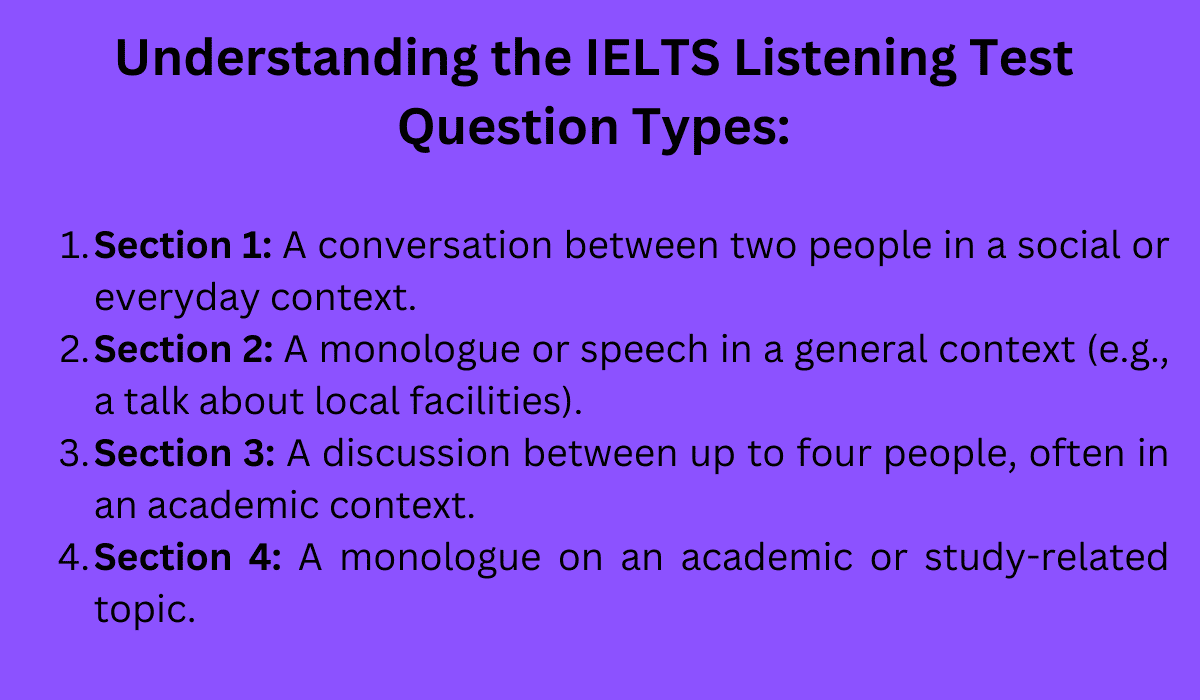IELTS Listening Strategies:11 Techniques for a High Band Score
The IELTS exam is one of the most popular English Proficiency tests if you want to go abroad for higher studies. The complete form of IELTS is the International English Language Testing System. It is easy to clear your IELTS if you want to get admission to an average college or university. However, if you’re going to get admission to renowned universities worldwide, in that case, the IELTS exam will be challenging for you because high-ranked universities often require high band scores, which may be challenging for many students. So, in this blog, we will share essential strategies to help you improve your IELTS band score in listening test.
Understanding the IELTS Listening Test Question Types:
Let’s first learn the format of the IELTS Listening Test. The test has four sections, and as it moves from one section to another, it becomes more difficult.

The IELTS Listening Test consists of 40 questions; you can score one mark for each correct answer. After that, your raw score is converted to a band score. If you want to achieve a high band score in the exam, then you need to understand the structure and prepare for the exam accordingly. So, let’s learn IELTS listening strategies in detail.
The Ultimate IELTS Listening Strategies for a High Band Score
- Familiarize Yourself with the Test Format:
Understanding the structure and format of the test is very important. You should not ignore the test structure even if you are an efficient listener. Besides, you should practice each question type mentioned below to avoid getting distracted on the test day.
- Multiple choice
- Matching
- Plan/map/diagram labeling
- Form/note/table/flow-chart/summary completion
- Sentence completion
- Short-answer questions
- Sharpen Your Listening Skills:
In the IELTS listening exam, you will be assessed on your familiarity with different accents, including American, Canadian, Australian, and British. That’s why you need to practice with different accents. The following are helpful strategies to improve your listening abilities:
- Listen to Diverse Audio Sources: Don’t limit yourself to the Cambridge IELTS listening practice test only; listen to varied podcasts and TED Talks and watch country-specific seasons and movies to expose yourself to different accents.
- Master the Art of Predicting Answers:
There are several answers that you can predict in the IELTS Listening exam. You are given a little time to review the questions in each section before the recording begins. So, you need to use that time wisely:
- Identify Keywords: You should highlight the keywords in the questions that signal what to listen for.
- Predict Answer Types: You can predict the answers by finding the fill-in-the-blank, which will have a name, a number, a date, or a specific term.
- Develop Focus and Concentration:
The audio is played only once in the test, so your attention may get distracted if you miss one answer. That’s why it is crucial to stay focused throughout the test.
- Avoid Overthinking: If you miss an answer, you should move on immediately to the next question. Because if you try to recall the answer, you may lose focus, and your following answers may be affected.
- Practice Mindfulness: You can improve your concentration by doing breathing exercises and meditation regularly for 2 or 3 months before the exam.
- Enhance Your Vocabulary:
A rich vocabulary can help you improve your IELTS Listening band score. Let’s learn how to improve your vocabulary in the following ways.
- The IELTS listening test generally uses synonyms and Paraphrases to check your overall understanding.
- You can also work on topic-specific vocabulary, particularly for academic and everyday contexts.
- Regularly review and practice new terms by making flashcards or using vocabulary apps.

- Learn to Multi-Task:
In the IELTS exam listening test, you are supposed to listen and read and write simultaneously.
- Practice Listening While Writing: Try taking notes while listening to audio recordings.
- Simulate Test Conditions: Try to solve at least one Cambridge IELTS Listening Test daily for a month or so. This can help you to be familiar with reading, writing, and listening simultaneously.
- Leverage Official Practice Materials:
Practice materials for the IELTS are pretty helpful, particularly those from official sources:
- Cambridge IELTS Listening Practice Tests: These reference materials include real test questions and audio samples.
- IELTS Official Website: Use the free online resources and practice exams.
- Refine Your Answering Techniques:
Your score may vary depending on how you respond to questions:
- Adhere rigidly to word limits: if the instruction states, “no more than two words,” follow it.
- Verify spelling and grammar: Errors in spelling and grammar can result in a mark deduction.
- Transfer Answers Carefully: You will transfer your responses to an answer sheet throughout the test. Make sure it’s clear and accurate.
- Recognize Typical Traps:
Distractors and traps are common in IELTS listening questions. Keep these in mind:
- False Starts: A speaker may start a sentence and correct it later.
- Multiple Options: Speakers may consider several options before confirming the correct one.Before completing your response, remain vigilant and listen for confirmation.
- Simulate Real Test Conditions:
You can improve your performance and decrease your anxiety by familiarizing yourself with test conditions:
- To simulate the test environment, wear headphones.
- Get comfortable finishing a whole listening exam without stops.
- Take your time to make sure the pace suits you.
- Review and Analyze Your Performance:
The post-practice analysis is just as important as the practice itself:
- Identify Weak Areas: Pinpoint question types or sections where you lose marks.
- Review Mistakes: Understand why you made an error and how to avoid it in the future.
- Track Progress: Maintain a log of your scores to monitor improvement over time.
Test Day Tips for the IELTS Listening Exam:

- Be there early: Allow enough time for you to relax and get settled.
2. Pack Necessary Items: Make sure you have your ID and any needed supplies.
3. Make Good Use of the Preparation Time: Before the audio begins, quickly review the questions and make predictions about the answers.
4. Remain Calm Under Pressure: Do not become anxious if you miss an answer. Pay attention to the next question.
Conclusion
We hope this blog will help you learn some new IELTS Listening tips & strategies. Getting a Band 9 on the IELTS Listening exam requires commitment, planning, and regular practice. You can confidently take the test if you understand its format, practice listening, and use the mentioned tactics. To succeed in the IELTS Listening module, remember that working smart is as important as working hard. Get ready now, and you’ll see your scores rise!
Read related Blogs:
10 Proven IELTS Speaking Test Tips and Tricks
10 IELTS Reading Test Tips and Tricks to Achieve 8+ Band Score
IELTS Writing Tips and Tricks: 10 Strategies for Assured Success

